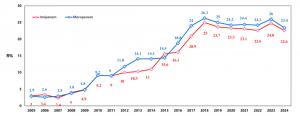Positive signs in the fight against superbugs: CHINET 2024 surveillance report
FAYETTEVILLE, GA, UNITED STATES, November 1, 2025 /EINPresswire.com/ -- The 2024 CHINET antimicrobial resistance surveillance report uncovers a hopeful trend in China's battle against bacterial resistance. While multidrug-resistant bacteria continue to threaten public health, this year’s findings show a significant reduction in resistance among several key pathogens, including methicillin-resistant Staphylococcus aureus (MRSA) and carbapenem-resistant Klebsiella pneumoniae. Despite the progress, the data also highlight persistent challenges with other superbugs like Acinetobacter baumannii, underscoring the need for continued vigilance and strategic antibiotic use.
Antimicrobial resistance (AMR) has long been a global health crisis, and China has been a key player in tracking and mitigating its effects. The China Antimicrobial Surveillance Network (CHINET) has been collecting data for years, aiming to understand the evolving resistance patterns across the nation. These efforts are part of a global strategy to combat AMR by monitoring the effectiveness of antibiotics and guiding clinical treatment. As China’s healthcare system confronts this growing challenge, the CHINET 2024 report provides valuable insights into both the successes and areas still in need of urgent attention.
In October 2025, the China Antimicrobial Surveillance Network (CHINET), led by the Institute of Antibiotics at Huashan Hospital, Fudan University, published (DOI: 10.1186/s44280-025-00092-0) its 2024 surveillance report in One Health Advances. The report provides an in-depth analysis of antimicrobial resistance trends in China, drawing from a large dataset of 458,271 clinical isolates from 74 hospitals across the country. The findings show positive developments in the fight against antibiotic-resistant infections, with a notable reduction in resistance among several key pathogens. However, it also highlights ongoing challenges, particularly with carbapenem-resistant organisms like Klebsiella pneumoniae and Acinetobacter baumannii.
The CHINET 2024 report presents a detailed picture of antimicrobial resistance across China, highlighting a mix of progress and ongoing concerns. Of the clinical isolates collected, Gram-negative bacteria dominated, representing 71.7% of the total, with E. coli, Klebsiella spp., and Staphylococcus aureus topping the list. Resistance to methicillin in Staphylococcus species has decreased slightly, with MRSA resistance dropping to 28.4%. Meanwhile, the resistance of Pseudomonas aeruginosa to meropenem and imipenem continued its downward trajectory, following a multi-year decline. However, Acinetobacter baumannii remains a formidable adversary, with resistance rates to imipenem and meropenem still hovering around 64%. Additionally, Klebsiella pneumoniae maintained high resistance levels, signaling a need for better management of carbapenem antibiotics and further research into alternative treatment options.
Dr. Fupin Hu, one of the lead researchers in the CHINET study, commented: "The slight reduction in resistance rates for key pathogens like MRSA and Pseudomonas aeruginosa is encouraging, but we cannot afford to be complacent. The persistent resistance in Acinetobacter baumannii and Klebsiella pneumoniae highlights the complexity of the AMR challenge. This underscores the importance of ongoing surveillance, responsible antibiotic use, and innovation in the development of new antimicrobial agents."
The findings from the CHINET 2024 surveillance report offer valuable guidance for healthcare providers across China and beyond. While the reduction in resistance rates for some pathogens is a positive sign, it is essential for hospitals to maintain strict infection control measures and to continue using antibiotics judiciously. The results also emphasize the urgent need for further research into new antibiotics and combination therapies, especially for resistant organisms like Acinetobacter baumannii and Klebsiella pneumoniae. Continued surveillance, coupled with global collaboration, will be crucial to sustaining these gains and addressing the ever-evolving threat of antimicrobial resistance.
References
DOI
10.1186/s44280-025-00092-0
Original Source URL
https://doi.org/10.1186/s44280-025-00092-0
Funding Information
This work was funded by the China Antimicrobial Surveillance Network (independent medical grants from Pfzer, 2023QD020), and the Shanghai Antimicrobial Surveillance Network (3030231003). The funders had no role in study design, data collection, analysis, decision to publish, or manuscript preparation.
Lucy Wang
BioDesign Research
email us here
Legal Disclaimer:
EIN Presswire provides this news content "as is" without warranty of any kind. We do not accept any responsibility or liability for the accuracy, content, images, videos, licenses, completeness, legality, or reliability of the information contained in this article. If you have any complaints or copyright issues related to this article, kindly contact the author above.

